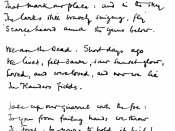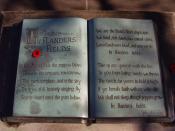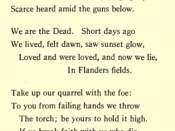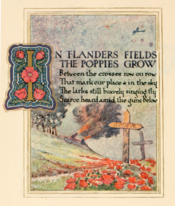"In Flanders Fields" is about World War I victims in the cemetery. When we read it, we are meant to feel sympathy for the dead victims of the war who rest in that field because we see their wonderful lives before the war and how it was ended fighting for their country. We are supposed to think of them and remember the war and all other wars and live fully the life they made for us. We are supposed carry on what they did. The deceased in this poem are afraid that we won't remember them and won't carry on their efforts and patriotism, even though the poppies grow in the graveyard for remembrance. We have to carry on the torch for them and for ourselves. From this poem, we also feel the fear of dying because those in this poem who once lived and fought for their country are now nothing but crosses in a graveyard.
This poem uses figurative language to get its very poignant message across. Mainly, it brings the dead back to life to narrate this poem. The first stanza of the poem provides visual imagery of the graveyard. The poppies blowing between the crosses are symbolic of remembrance. The larks, "still bravely singing," are personified to express bravery, which is a human emotion. The "guns below" are the ceremonies held for these men who bravely fought. Basically we are shown the beauty of the graveyard and signs of people remembering the deceased. The second stanza introduces the leader to not only their death, but also their life. Suddenly we feel sympathy for the young people buried here, whose lives were ruined by terrible warfare. In the third stanza we are shown the anguish of their spirits. They are brought to life in this poem to send us their message. Their "failing hands" can not of course literally throw a torch, which is symbolic of the war effort and patriotism. This is simply meant to represent the legacy that they are leaving behind them. This stanza is a paradox of the first, saying that peace and remembrance does not come from mere ceremony, but from us living out their legacy. The message in this poem is for all to live and understand.





